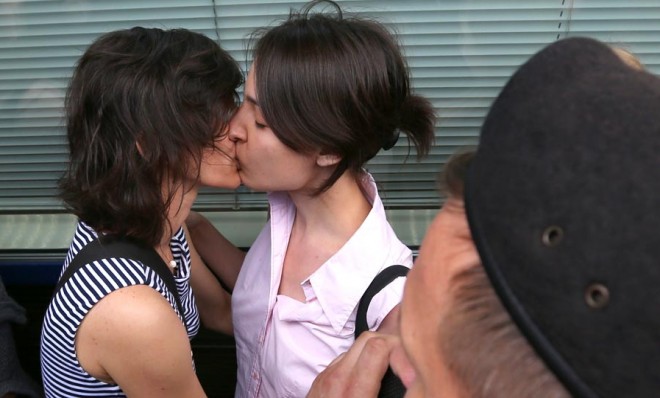Russia's war on gay pride
President Vladimir Putin is on the verge of signing a law banning gay "propaganda"


A free daily email with the biggest news stories of the day – and the best features from TheWeek.com
You are now subscribed
Your newsletter sign-up was successful
Russia's lower house of parliament, the State Duma, on Tuesday unanimously passed a measure banning gay "propaganda." Police detained more than 20 gay-rights activists after they staged a "kissing protest" and were attacked by anti-gay thugs affiliated with the Russian Orthodox Church. The law still must be approved by the upper house and signed by President Vladimir Putin, but both are expected to endorse it. Here, a guide to Russia's crackdown on gay rights:
What does the law say?
It bans spreading "propaganda of nontraditional sexual relations" to children. Backers of the bill defined "nontraditional" relations as those "not conducive to procreation." Basically, it will be illegal to say or do anything that provides information about homosexuality to anyone age 18 or younger.
The Week
Escape your echo chamber. Get the facts behind the news, plus analysis from multiple perspectives.

Sign up for The Week's Free Newsletters
From our morning news briefing to a weekly Good News Newsletter, get the best of The Week delivered directly to your inbox.
From our morning news briefing to a weekly Good News Newsletter, get the best of The Week delivered directly to your inbox.
What does it mean in practice?
The law almost certainly means gay-pride events will be forbidden — but it could go far beyond that. Communist leaders, for example, have branded Elton John's outfits "gay propaganda," and an anti-gay group last year sued Madonna, claiming she promoted homosexuality in a concert. Activists are afraid that anything they say in support of gay rights could get them in trouble.
How much trouble?
Any individual found to be in violation of the law could be fined up to 5,000 rubles ($156). Media organizations would face fines up to 1 million rubles ($31,000).
A free daily email with the biggest news stories of the day – and the best features from TheWeek.com
Does this mean homosexuality is illegal?
No. The country decriminalized homosexuality in 1993, although anti-gay sentiment remains high, as the violence against the activists staging Tuesday's "kissing protest" confirmed. As lawmakers voted, anti-gay picketers carried signs in front of the Duma. One read: "Lawmakers, protect the people from perverts!" Moscow has even considered banning the adoption of Russian children by citizens of countries where same-sex marriage is permitted.
Why now?
The "gay propaganda" law is part of a push to promote traditional Russian values, as opposed to Western ones the Kremlin and the Russian Orthodox Church say have fueled anti-Putin protests and corrupted the country's young people. A companion law will ban "offending religious feelings of the faithful," a follow-up to last year's incarceration of members of the punk band Pussy Riot for performing an anti-Putin protest in an Orthodox cathedral.
Sources: Associated Press, BBC News, Huffington Post, Reuters
Harold Maass is a contributing editor at The Week. He has been writing for The Week since the 2001 debut of the U.S. print edition and served as editor of TheWeek.com when it launched in 2008. Harold started his career as a newspaper reporter in South Florida and Haiti. He has previously worked for a variety of news outlets, including The Miami Herald, ABC News and Fox News, and for several years wrote a daily roundup of financial news for The Week and Yahoo Finance.
-
 Corruption: The spy sheikh and the president
Corruption: The spy sheikh and the presidentFeature Trump is at the center of another scandal
-
 Putin’s shadow war
Putin’s shadow warFeature The Kremlin is waging a campaign of sabotage and subversion against Ukraine’s allies in the West
-
 Media: Why did Bezos gut ‘The Washington Post’?
Media: Why did Bezos gut ‘The Washington Post’?Feature Possibilities include to curry favor with Trump or to try to end financial losses
